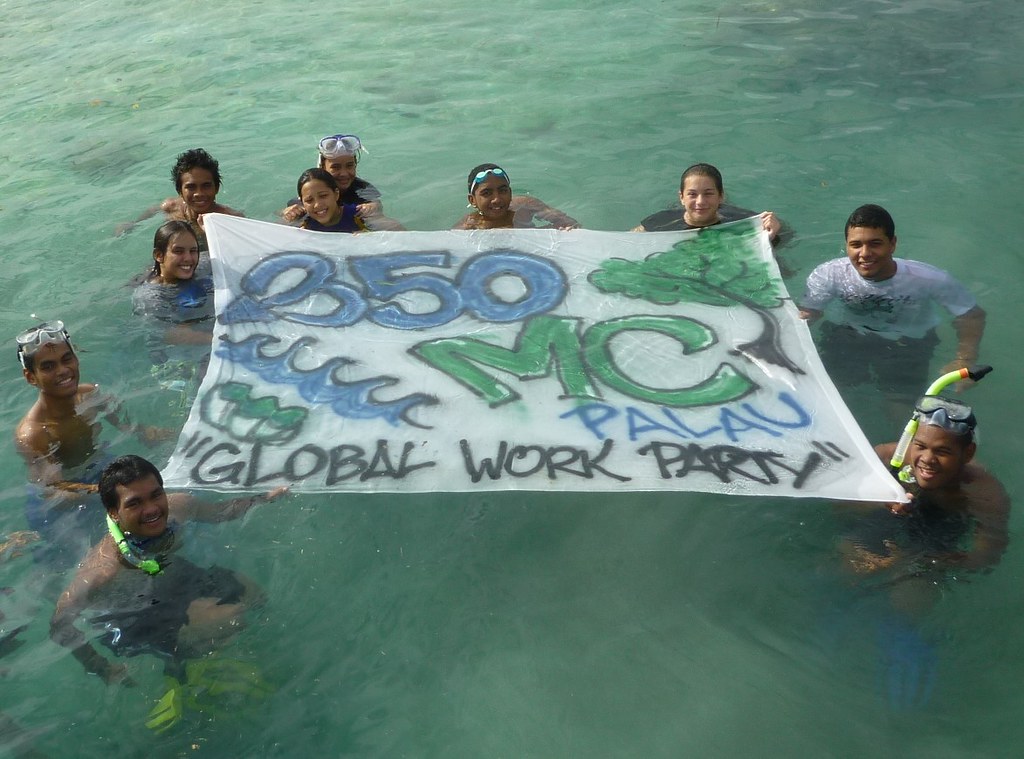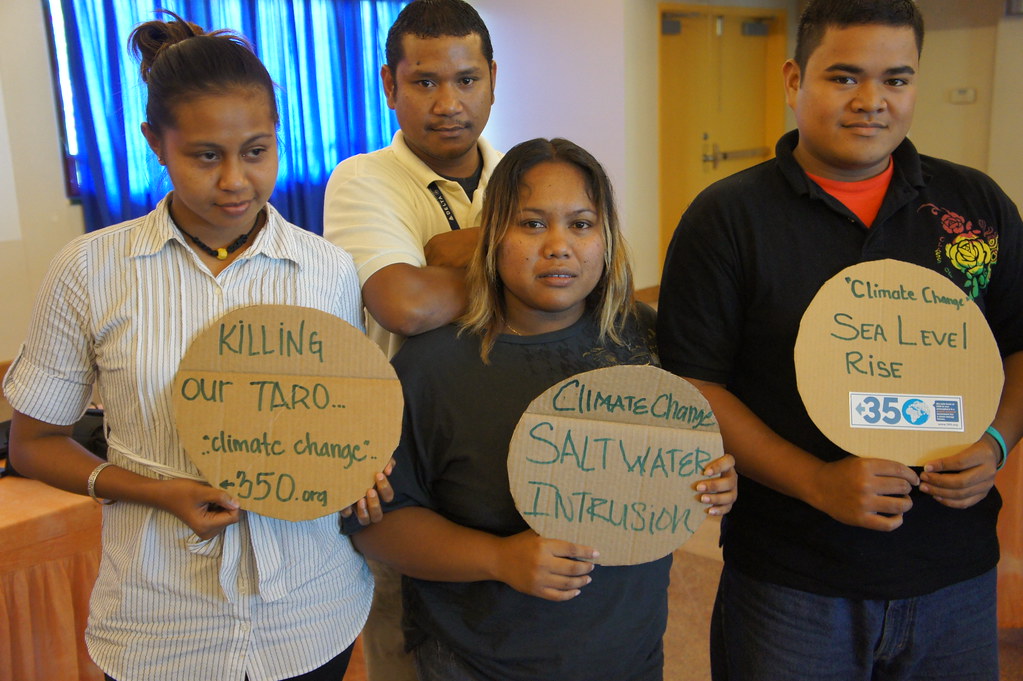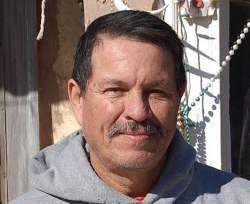Super Typhoon Bopha has ripped through Palau
Right now, the Pacific Island nation of Palau is in a State of Emergency. Super Typhoon Bopha just ripped across the islands, causing what President Toribiong called “catastrophic destruction". While there is no reported loss of life yet, the winds and storm surge resulted in “scores of people … rendered homeless for the foreseeable future.”
As you can see, our friends in Palau have been a big part of the 350.org movement in the last few years. Earlier this year in preparation for the Connect the Dots day of action, we worked with our team there (led by Leonard Basilius at the Palau Community Action Agency) to hold the 350 Palau Youth Climate Leadership workshop. It's really tough to know them personally, know that they're hurting right now, and there's not much we can do to help.

The most important thing we can do is stand is solidarity with them, make sure their story is heard, and keep organising and fighting to move the world beyond fossil fuels. I'm writing this from Auckland, New Zealand - where we are half way through the Pacific Youth Looking Beyond Disaster forum, which is a collaboration with UNESCO New Zealand. We just held a minute of silence in prayer for our brothers and sisters from Palau.
The forum is made up of 50 young people from across New Zealand the South Pacific Islands, from Tokelau to Kiribati. We've been - as the name suggests - sharing stories of facing and recovering from disasters. We've also been planning a Pacific wide climate campaign - to be launched in a couple of days time, at Power Shift NZ-Pacific.
Starting on Friday, we've got 700 young people converging for Power Shift NZ-Pacific, where we'll be hearing from the likes of Bill McKibben, Naomi Klein to our Pacific organisers like Christina Ora and Brianna Fruean. Never before has the climate movement in the South Pacific come together like this. We'll report back on that soon, but for now, we're sending strength, hope and solidarity to our friends in Palau.

Daniel Dancer’s Latest 350 Masterpiece featured on Today Show
 Our dear friend and frequent collaborator Daniel Dancer -- who has worked with us from India to Washington, DC -- recently produced a new piece that was featured on the Today Show. In this example, Dancer worked with 1,200 students in North Carolina to send this climate message. You can read more about this piece, and Daniel's work, here.
Our dear friend and frequent collaborator Daniel Dancer -- who has worked with us from India to Washington, DC -- recently produced a new piece that was featured on the Today Show. In this example, Dancer worked with 1,200 students in North Carolina to send this climate message. You can read more about this piece, and Daniel's work, here.
Climate march through the streets of Doha
It wasn't the largest international climate march there has been -- except that it was the first ever protest march of any sort here in Doha, Qatar. Hundreds of people joined the march organized by Doha Oasis, IndyACT, and the Arab Youth Climate Movement. It was an unprecedented event for the local climate movement and a beautiful expression of the energy and passion of the Arab Youth Climate Movement.
It is abundantly clear that the UN meetings will not deliver action according to what science and justice demand until our movement outside the meetings is larger and more powerful. In that light, to see the movement pick up here on the streets of Doha and build momentum for the whole Arab region is most hopeful aspect of this convergence here in Doha. It's up to all of us to keep that momentum going now -- not just in the Arab world, but everywhere.
Doing the Math: Carbon Zero
We're doing the math, but what's the right answer? According to Alex Steffen, it's zero. Zero emissions, that is.

Sooner or later (hopefully sooner) we're going to need to stop adding more CO2 to the atmosphere. In his new book, *Carbon Zero: Imagining cities that can save the planet*, Steffen argues that cities can and should take the lead in getting us there.
Steffen explores how through taking bold action now, cities can cut their emissions down to net-zero. By shifting away from energy-intensive centralized and car-dependent systems to people-focused communities and energy-frugal innovations cities can cut deeply the amount of energy they need to provide a high quality of life, and then meet the remaining demand with clean sources like wind and solar. Zero won't be easy. But zero is achievable. Steffen's book is a short, compelling tour of the urban future that invites us to imagine winning the climate fight.
Steffen's also a big supporter of 350. So he's inviting 350 supporters to read his book, for free. Just sign up at https://eepurl.com/snCQv to receive a PDF of Carbon Zero you can read and share.
Want to read it online? Grist is featuring the book for a week, sharing a chapter a day: https://grist.org/cities/how-
Divest!
The email below just went out to our supporters in the USA. Not on our list yet? Sign up here!
Greetings from the Do The Math tour bus!
We’re bouncing up the road to Madison, WI right now after another sold-out show in Chicago last night.
As you might already know, one of the goals of this tour is to launch a new fossil fuel divestment campaign at colleges and universities across the country -- it's a critical way to fight back against corporate polluters.
Here’s how you can help:
If you’re a current student, please click here to join or start a campaign on your campus on our brand new website: gofossilfree.org
If you’re an alumnus/alumna, please click here to tell us where you went to school and join the national campaign. We’ll be in touch soon about how you can connect with and support students at your alma mater.
And if you're not a student or an alum, don't worry -- there will be lots for everyone to do in the weeks ahead.
Why divestment? Well, we know that fossil fuel companies are principally concerned about two things: their bottom line and their public image. A nationwide movement forcing our schools to divest from fossil fuels will deal a serious blow to both.
Over 100 campuses have already joined the divestment campaign, and it’s generating real excitement everywhere we go. From big schools like the University of Wisconsin to small colleges like Middlebury, the campaign is picking up speed (at Harvard, a student resolution supporting divestment just passed with 72% of the vote!).
Now, it’s absolutely crucial that we keep the momentum going -- click here to get involved: www.gofossilfree.org
Many, many thanks,
Bill
P.S. You can also follow along with the divestment work on our brand-new Fossil Free Facebook and Twitter accounts.
Houston Residents Worry about Burden of Keystone XL Pipeline on Local Neighborhood
The post below is from our friend Cherri Foytlin over at the Bridge the Gulf Project.

“We are part of America. We are a major city in America, but we do not need to be the sacrifice zone for the nation,” states Houston resident Juan Parras (pictured).
Parras joins a growing contingent of Houston residents concerned about the overburdening of minority and low-income communities in the area with the ill effects of energy production.
“There has been a lot of studies conducted, and one of them in particular is a study conducted on leukemia cases within a 2 mile radius of the Houston ship channel. The chances of contracting leukemia here are 56 percent, and of course, this is related to the petrochemical industry. We also have a lot of asthma, tumors - all of the things people do not want in their communities can be found here.” he explains.
As a founder of the group Texas Environmental Justice Advocacy Services (TEJAS), Parras is no stranger in working to protect Houston neighborhoods from the hazards of air and water pollution. "[TEJAS] started doing environmental justice work here in Houston in the year 2004. There is a lot to be done here, because we have the highest concentration of refineries and petrochemical plants in the nation,” he says.
VIDEO: Community advocate Juan Parras of Texas Environmental Justice Advocacy Services describes the area of Manchester - an environmental justice community in Houston, Texas. Like so many communities across the nation, Manchester disproportionately bears the burden of health problems due to industrial pollution in the area. According to Parras, the Valero plant in Manchester will most likely be a final destination for tar sands oil traveling through the Keystone XL Pipeline. Watch more: Houston Residents Worry About Tar Sands Oil Pollution
Fossil Fuel Divestment Campaign Spreads to Over 100 Campuses!
Here's an update about our growing Fossil Free campaign. Click here to visit the campaign website and learn more about how you can join the effort.
Wow! We launched this new fossil fuel divestment campaign this November 7 and in less than a month campaigns have sprung up on over 100 colleges and universities across the country. From big schools like the University of Michigan to small liberal arts colleges like Amherst, the idea of divestment is spreading like wildfire.
It’s hard to keep up with everything that’s going on across the country, but here are a few updates from the growing movement. Earlier this month, Unity College in Maine became the first in the nation to meet our demands and fully divest from fossil fuels (Hampshire College in Massachusetts has also passed a sustainable investment policy that effectively divests them from fossil fuels). At Harvard, a student resolution supporting divestment just passed with 72% of the vote and students are now pushing to meet with President Faust about divestment. Just north, UNH students will be delivering 1,000 signatures to their president today to call for a meeting on divestment (they’re already getting AP coverage for the action). Down the coast, at Brown, students are also rallying to today to push their administration to divest from coal.

Students share information about the divestment campaign at a Do The Math tour stop.
Over in the midwest, students are calling on the Badgers to divest and just published an editorial in the University of Wisconsin’s campus newspaper (more editorials are popping up across the country, like this one from Cornell). At University of Colorado in Boulder, students are preparing for a big Do The Math tour stop next week. And out in California, the five Claremont colleges have banded together to push for divestment across the system. Not to be outdone, the University of California schools are also hard at work, joining with our partners at the California Student Sustainability Coalition to push for divestment.
Telling the Visual Stories of Climate Impacts
All too often, the climate crisis is described in the abstract, through charts and graphs and reports. These analytical tools can be useful for communicating the basic science, but they often fail to make the scale and stakes really hit home.
At 350.org, we believe in the power of visuals and storytelling to show the global warming for what it is: a dangerous crisis that is affecting millions of people every day. Today, we're spotlighting two amazing projects that drive this point home.
The first is called RISE, and it's using audio-visual "web stories" to document how climate change is affecting coastal communities -- here's a potent video about a family, their farm, and a legacy worth preserving:
The second project is called "Sandy Storyline", and it's a new collaboration of MIT Center for Civic Media, in partnership with Interoccupy.net, Occupied Stories, and a growing number of media makers, storytellers and people like you. It's a powerful document of the storm's aftermath, and of the resilience of the communities left in its wake.
Head on over to SandyStoryline.com to add your story and help drive the climate crisis home.
Finally, if you have stories of your own local climate impacts, the Connect the Dots Tumblr is a great way to share them -- check it out and submit your photos and stories here.
An open letter to governments and their negotiators
As the UN climate negotiations kick off in Doha, Qatar, people all over the world are watching as floods wash away their lives, fires consume their houses and droughts decimate food crops. Just this morning, UNEP released a report warning that melting permafrost could release massive amounts of methane--a powerful greenhouse gas--into the atmosphere, bringing the planet ever closer to runaway climate change. Here's a letter from three powerful advocates for a safe climate to the leaders and negotiators in Doha:
A UN climate meeting in an oil state — hope on the horizon
It's opening day of this year's UN Climate Talks in Doha, Qatar. Technically known as the 18th Conference of Parties (COP18) of the United Nations Framework Convention on Climate Change (UNFCCC), the meetings are the annual acroynm heavy negotiations dedicated to saving our planet.
Sadly, it seems that our politicians still aren't up to the task. Expectations for concrete progress in Doha are low and the irony of hosting the climate talks in an oil state like Qatar isn't lost on anyone (the deputy prime minister speaking at a recent "Oil and Money" Conference to celebrate fossil fuels didn't help the perception). At 350.org, we're most excited about the work that is happening outside of the negotiating halls.

Young people are at the forefront of that work, particularly the 12-weeks-old Arab Youth Climate Movement. Youth here in Doha just wrapped an inspiring 8th Conference of Youth, a chance for young leaders from around the world to meet, discuss plans, and strategize together. This morning, young people welcomed delegations to COP18 with a reminder to connect the dots between the extreme weather and climate impacts with the larger climate crisis.
You can support the Arab Youth Climate Network by signing their petition calling for action from Qatar and all Arab countries here:
https://350.org/arableadership
It's inspiring stuff to see youth from around the world standing shoulder to shoulder to call for climate action, but if we're going to have any chance of overcoming the power of the fossil fuel industry and force our governments to act, we're going to need to scale up our movement dramatically.
